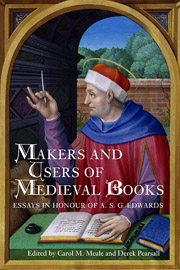Book contents
- Frontmatter
- Contents
- List of Illustrations
- Contributors
- Preface
- List of Abbreviations
- COMPOSITION
- COMPILATION
- Codicology, Localization, and Oxford, Bodleian Library, MS Laud Misc. 108
- The Fillers of the Auchinleck Manuscript and the Literary Culture of the West Midlands
- PRODUCTION
- OWNERS, PATRONS, READERS
- AFTERLIVES
- A. S. G. Edwards: List of Publications
- Index of Manuscripts and Early Printed Books
- General Index
- Tabula Gratulatoria
Codicology, Localization, and Oxford, Bodleian Library, MS Laud Misc. 108
from COMPILATION
Published online by Cambridge University Press: 05 May 2014
- Frontmatter
- Contents
- List of Illustrations
- Contributors
- Preface
- List of Abbreviations
- COMPOSITION
- COMPILATION
- Codicology, Localization, and Oxford, Bodleian Library, MS Laud Misc. 108
- The Fillers of the Auchinleck Manuscript and the Literary Culture of the West Midlands
- PRODUCTION
- OWNERS, PATRONS, READERS
- AFTERLIVES
- A. S. G. Edwards: List of Publications
- Index of Manuscripts and Early Printed Books
- General Index
- Tabula Gratulatoria
Summary
Research into English medieval literary manuscripts is frequently hamstrung by lack of evidence about their place of production, as Guddat-Figge noted: ‘the localization of manuscripts, which would considerably facilitate the studies in the istribution of Middle English romances, has not been extensively explored‘ Despite recent important publications, the study of literary genres other than romance across the medieval period could equally benefit from a better understanding of the precise regional and temporal milieux in which surviving manuscripts were copied. Localizing medieval literary manuscripts is problematic, because direct internal and external evidence is often difficult to come by. Scholars have therefore developed comparative methodologies, which explore codicological details such as decoration, dialect and hand (including main copyists and annotators), to offer suggestions about regional trends, production centres and scribal identities. Other codicological features, however, are rarely called upon to assist with issues of localization.
I would like to thank Tony Edwards for the numerous discussions we have had on medieval manuscript production and in particular on MS Laud Misc. 108. My thanks also to Elaine Treharne for reading a version of this paper and for her suggestions, Gowan Dawson for suggestions, and to Martin Kauffmann for giving me permission to consult MS Laud. Misc. 108. I, of course, take full responsibility for any errors.MS Laud. Misc. 108. I, of course, take full responsibility for any errors.
The study of the physical construction of a book, for instance, marks important advances in the bibliography of the medieval book, but little work has been done on trying to use the information derived from this methodology to map a manuscript to a known geographical place.
- Type
- Chapter
- Information
- Makers and Users of Medieval BooksEssays in Honour of A.S.G. Edwards, pp. 48 - 59Publisher: Boydell & BrewerPrint publication year: 2014

